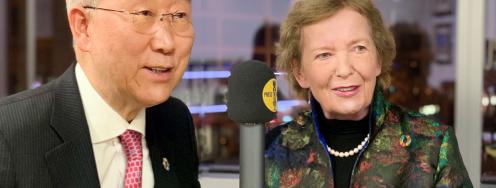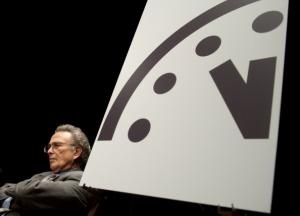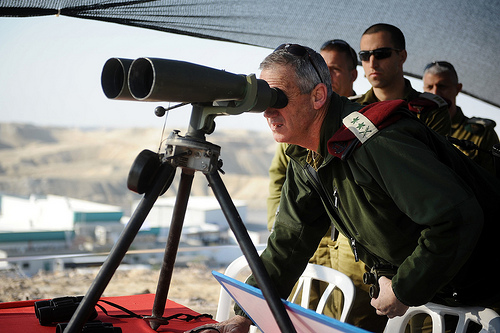CBO: $348 Billion on Nuclear Forces Over Next Decade
CBO: $348 Billion on Nuclear Forces Over Next Decade
On the radar: Nukes are expensive; Getting more expensive; Carter and the nuclear piggybank; Unnecessary politicization from Netanyahu; Editorials weigh in on Iran; the Aftermath of a deal; and It’s 2 minutes to midnight.
On the radar: Nukes are expensive; Getting more expensive; Carter and the nuclear piggybank; Unnecessary politicization from Netanyahu; Editorials weigh in on Iran; the Aftermath of a deal; and It’s 2 minutes to midnight.
January 23, 2015 | Edited by Jacob Marx and Will Saetren
$348 billion for nukes - “Over the 2015–2024 period, the Administration’s plans for nuclear forces would cost $348 billion, an average of about $35 billion a year,” a new report from the Congressional Budget Office has found.
--These estimates are lower overall than previous estimates due to “budget-driven delays in several programs, including a three-year delay for the new cruise missile and its nuclear warhead and longer delays in some programs for extending the useful lives of nuclear warheads, [which] have reduced the costs projected for the next decade.” Full report here. http://1.usa.gov/1JhhqxI
Tip of the iceberg - CBO’s estimates represent “the tip of the coming budget bow wave” writes Kingston Reif for Arms Control Now. “Over the next 30 years, the bill could add up to $1 trillion.” Reif explains the fiscal and strategic errors of spending this much on nuclear forces.
--“CBO’s reports on the projected costs of nuclear forces have brought a much-needed dose of fiscal perspective to the debate about the future of the U.S. nuclear arsenal. Whether one thinks the United States has too many or too few nuclear weapons, it is no longer possible to hide from their immense cost,” writes Reif. Full analysis here. http://bit.ly/1zACZaM
Carter’s challenge - When Ashton Carter is confirmed next month, “he will face a dilemma: the Pentagon’s trillion-dollar plans to modernize the U.S. nuclear arsenal are excessive and unaffordable. As the Air Force and Navy admit, their nuclear shopping lists outstrip their budgets.” As Tom Collina writes in Defense One “This gives Carter an historic opportunity to bring the nuclear weapons budget in line with U.S. security needs.”
--“There are real advantages to scaling back the nuclear enterprise. Carter will presumably want to start new projects and expand others, such as cybersecurity (think Sony hack and North Korea) and anti-terrorism (Paris terror attacks), and he will have to find the money from within his own budget. The good news is that the nuclear piggy bank is over-stuffed and ripe for a withdrawal.” Full column here. http://bit.ly/1upjcUO
Politics cross water’s edge - Prime Minister Netanyahu’s surprise invitation to address Congress “is straining relations between Israel and its closest ally,” writes Greg Jaffe in The Washington Post. Netanyahu is expected to give a full-throated call for new sanctions on Iran. President Obama warned such sanctions would cause delicate nuclear negotiations to collapse and increase the risk of war with Iran. In response to the invite, the President, Vice President and Secretary of State have all declined to meet with Netanyahu. Full story here. http://wapo.st/1yCheWi
Overstepping - “Even Democratic lawmakers who intend to go against the administration and support new sanctions taken aback by the Boehner-Bibi move. ‘Netanyahu is shooting himself in the foot,’ one of them said, ‘because by turning this into a partisan issue, he may be forcing some Democratic members to choose between Boehner and Obama, which, for them, is no choice at all.’” Full column by Chemi Shalev for Haaretz. http://bit.ly/188a02L
Tweet - @Ali_Gharib: Pro-Israel stalwart Kirsten Gillibrand won't support new #iran sanctions http://cnn.it/1JhvUxu
Not worth the risk - “New sanctions would be a mistake, undermining the ongoing negotiations and reducing the chances of a final agreement between Iran and the United States and its allies,” write the editors of The Boston Globe.
--”Progress in getting Iran to halt its nuclear program has been slow but steady since the signing of an interim agreement in November 2013...What remains is for an agreement that would guarantee an Iranian nuclear program limited to energy production, and a plan for transparency, allowing continued monitoring by international inspectors. There’s no downside to letting these negotiations continue unhindered by new sanctions.” Full editorial here. http://bit.ly/1Ea2sJK
No time to meddle - “For Congress to threaten new sanctions during talks between Iran, the U.S. and other world powers profoundly handicaps the negotiators and gives Iran an excuse to walk away,” write the editors of The Chicago Sun-Times in an article blasting Boehner and Netanyahu’s recent move.
--”The collapse of negotiations could easily lead to an armed conflict. Meddling now in the negotiations — at the moment when a credible deal is possible — can’t amount to any good. And, most important, there is plenty of time to impose stiffer sanctions on Iran if negotiations fall apart.” http://bit.ly/1yCdDYp
Republican push - “Republicans are clashing over the best strategy for confronting President Barack Obama over his attempts to strike a nuclear deal with Iran,” write Burgess Everett and Manu Raju in
--“Senior Republicans and sources familiar with the process said both proposals would get floor votes in some fashion and portions of them could be merged into a final product, perhaps one as an amendment to another.” Full story here. http://politi.co/1y80ZeM
Easy does it - “In the immediate aftermath of an agreement the United States [and Iran] should pursue a patient, limited and piecemeal approach focused first on areas where cooperation would be most natural and least worrisome to our Arab partners,” write Ilan Goldenberg, Jacob Stokes, and Nicholas A. Heras in The National Interest.
--“Over time, this policy can expand and eventually move Iran and the United States towards a much more normal relationship akin to those with China or Russia where the two states work together on issues of common interest even as they continue to compete when their interests diverge. Such an outcome could truly improve the regional-security environment of the Middle East. But Iran’s decision to address the international community’s concerns about its nuclear program must be the first step.” Full column here. http://bit.ly/1GHzFyE
Tick-tock - “It is now three minutes to midnight, according to The Bulletin of Atomic Scientists, which is warning that the end of humanity may be nigh… The time is symbolic,” writes Abby Ohlheiser for The Washington Post. “Sitting at the intersection of art and science, and it has wavered between two minutes and 17 minutes til doom since the clock's inception in 1947.” The new time “is the closest the clock has been to Doomsday since 1984.” Full story by here. http://wapo.st/1CVUxfn
Tweet - @carnegiepp: Concern that the amended Russian military doctrine would alter conditions for nuclear weapons’ use was premature: http://ow.ly/HLpvk
Quick Hits:
--“Congress should delay new Iran sanctions,” by Larry Hanauer in The Hill. http://bit.ly/1yMBN2Q
--“Congress Shouldn't 'Blow Up' Iran Nuke Talks,” by Daryl Kimball in The National Interest. http://bit.ly/1AV057B
--“Missile launch officer dismissed from Air Force for drug use,” via the Associated Press. http://1.usa.gov/1CJJVQn
--“Navy opens submarine billets to female enlisted,” reports Steven Beardsley for Stars and Stripes. http://1.usa.gov/1CnJPjR
--“U.S. weighed giving Japan nuclear weapons in 1950s,” by Masakatsu Ota for The Japan Times. http://bit.ly/15DIUiM
--“Nuclear Regulatory Commission names new inspector for MOX facility,” by Meg Mirshak The Augusta Chronicle. http://bit.ly/188heUb
Events:
--Senate Banking Committee, hearing on "Perspectives on the Strategic Necessity of Iran Sanctions," with witnesses TBA. January 27 at 10:00 a.m. Located in the Dirksen Senate Office Building, room 538, Washington DC. Webcast on the committee website.
--"Australia and the Bomb," featuring Christine Leah, Yale University; Christian Ostermann, Wilson Center; and Elbridge Colby, Center for a New American Security. January 28, 2:00-3:30 p.m., Wilson Center, Sixth Floor, Reagan Building, 1300 Pennsylvania Ave. NW, Washington. RSVP online.
-- “Debunk the Myths of Iran Sanctions,” featuring Kate Gould, Legislative Associate for Middle East Policy, Friends Committee on National Legislation. Hosted by Physicians for Social Responsibility. Wed, Jan 28, 2015 8:30 PM - 9:30 PM EST. Register here.
--"Avoiding Disaster in a New Era of Superpower Tension." Featuring Nikolas Gvosdev, U.S. Naval War College; Fiona Hill, Brookings Institution; Ali Wyne, RAND; and Elbridge Colby, Center for a New American Security. January 29 from 6:30-8:00 p.m. Located at the FHI Conference Center, Eighth Floor, 1825 Connecticut Ave. NW, Washington DC. Sponsored by PS21: Project for the Study of the 21st Century. RSVP. online
--“Rally to Say No to a $1 Trillion Nuclear Arsenal.” Hosted by Global Zero, from 1:00-3:00 p.m. on January 31. Located at the Ellipse (south of the White House), Washington, DC. RSVP online.
--"The Nuclear Enterprise: Past and Future." Featuring Michael Elliott, Deputy Director for Strategic Stability Plans and Policy Directorate, Joint Chiefs of Staff. February 3 from 9:30-10:30 a.m. Located at the Center for Strategic and International Studies, Second Floor Hess Room, 1616 Rhode Island Ave. NW, Washington DC. RSVP online.



